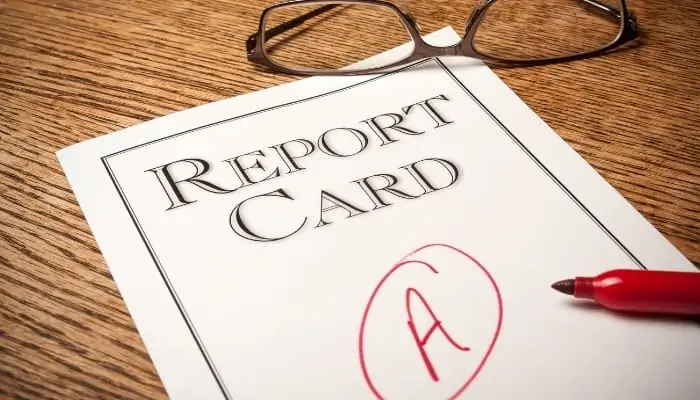How Should Parents React to Bad Grades?

This post may contain affiliate links. If you buy through the link, I may earn a commission. Learn More.
I have been extremely fortunate that my children tend to get very good grades. They both like school and love learning, which makes classwork somewhat easy for them.
However, like most parents, we have had to deal with some bad grades. It’s not fun for parents or kids.
*FYI, some of the links in this article about how should parents react to bad grades may be affiliate links. If you click and make a purchase, we may get a commission (at no extra cost to you). For more info, please see our disclaimer.
How Should Parents React to Bad Grades?
It’s important to remain cool, calm, and collected when dealing with bad grades. Talk about the grade with your child. Find out how and where they can improve. If necessary, talk with the teacher(s) about any steps that should be taken to improve the grade. You may also need to consider hiring a tutor.
How to Manage Your Child’s Bad Grades

This is a true story. My son is extremely intelligent. He has never had to study, even when he took high school-level honors classes in the seventh grade.
He is currently a sophomore who is disappointed in his 99 percent grade in Honors Calculus. If you think I have never had a problem with his grades, you would be sorely mistaken.
My son has no problem in his AP World History class or Honors Biology. On the other hand, up until about a week ago, he was pulling a D- in Acting. Why? Because it was too easy.
He assumed he didn’t have to do any work and he could slide through. He had to come to a stark realization that D- in Acting can bring down his grade just as easily as any other class.
This isn’t the first time he has had these kinds of troubles. In fact, it’s not even the third time. Each time he’s given a class typically thought of as an “easy A,” he invariably makes that class the most difficult of all.
Luckily, I’ve found some ways to get through to him that you may be able to implement with your children.
1. Have Patience and Understanding
The first thing I do when I see a bad grade is to try to find out why and how it happened. Is the class too difficult? Is my child too busy to adequately study or complete homework? Is there a possibility a mistake was made?
It’s important to get to the root of the problem before jumping to conclusions.
Occam’s Razor teaches us that sometimes the simplest answer is the right one. The child isn’t doing their homework or studying for exams. If that is the case, find out why.
Are they not inspired by the subject, or do they not understand it? If it’s the former, work with your child to find ways to make the subject matter more interesting. If it’s the latter, talk the issue over with your child’s teacher. Ask about after-school tutoring or study sessions that can help.
Find a Tutor for Your Child
Whether it’s math, science, reading, or any other subject, help your child excel in school by finding a qualified tutor.
2. Follow Up and Follow Through
When my son started middle school, his school counselors gave a presentation to the parents about how to check grade status and homework online. They said that we should not trust our children to tell us because they will lie.
I thought that was a horrible thing to say to parents. I was angry. I trusted my son.
That was a mistake. The school counselors know what they’re talking about because they have been doing their jobs for a long time. I realized this when I learned that my son was failing Health simply because he had stopped doing the homework.
Since then, I have watched his grades and homework every day. My daughter, who just started middle school, is getting the same oversight. When I see an assignment isn’t turned in or a test grade is lower than I expect, I follow up. It’s a necessary evil.
There may be a need to incentivize your child to complete their homework or improve their study habits. That incentive depends entirely on your child.
For instance, my son is heavily involved in extra-curricular activities that take up a lot of his time. His father and I agreed that he will need to be pulled from all of those activities if he doesn’t keep up with all of his classes.
That negative reinforcement works for him but only because he knows we are serious. An empty gesture won’t garner any results. You must have follow-through.
3. Remove Any Unnecessary Burdens
Both of my children are extremely busy with their extra-curricular activities. It’s something that weighs heavily on my mind, but it seems to be the norm in today’s busy world.
Children are given schedules that are packed to the brim, leaving them almost no time for their studies.
When you see bad grades, think about all of these activities and how they might cause stress on an already anxious time. Burdens don’t just come from extra-curriculars either.
Some children may be dealing with depression, heartbreak, bullying, or peer pressure. They might be responding to problems at home as well. Make sure you know where your child is mentally before you start yelling about that low grade.
4. Set Reasonable Expectations
Both of my children are straight-A students.
However, I have told both of them that I don’t expect A grades. I only expect them to do their best. They need to hand in homework assignments that are completed to the best of their abilities.
They need to study for tests. I will never be angry if they do all of that and still end up with a lower grade.
I always had good grades in school except when it came to Band. As hard as I tried, I couldn’t get that saxophone to make noises that weren’t a crime against music.
While there are people like me who will never be great at playing a band instrument, there are also people who will struggle with math or English composition.
If you know your child has issues in a certain area, make allowances. Help them achieve the best they can, but accept that it may not be the grade you had hoped to see.
Related: Should Parents Force Their Child to Study?
5. Talk to Your Child’s Teacher

It’s absolutely reasonable to talk to your child’s teacher when you see a bad grade. Whether that grade is on an assignment or your child’s report card, reach out to the teacher. They might have some insight as to how to improve.
For example, last year, my daughter started struggling in math. It was a shock to all of us. After talking with her teacher, we realized the problem wasn’t with her understanding of the material but with her eyes. One pair of glasses later, and all of her problems were solved.
Teachers do have a lot on their plates, but they choose that profession because they want to help young people. Never feel bad about contacting the teacher unless you intend to play the blame game.
The teacher should be consulted about your child’s poor performance, not blamed for it. Remember to reach out to them with kindness, not accusations.
Related: How Should Parents Address Teachers?
6. Set Future Goals
My son didn’t get in trouble for having a D- in Acting. I told him to talk with his teacher, fix the problem, and keep that grade up. I explained to him that in classes that come very easy for him, I expect an A.
In classes that require more work, I expect his best. The goal we set together was for him to make sure his homework was handed in every day, but that’s not all.
He wants to go to Harvard, but to do that, he needs to have a real plan. He will need to take specific classes and earn high grades in all of them. He knows exactly what grades he needs to even be considered for entry into an Ivy League school.
Having that goal in mind helps to keep him in check. He just needs a reminder from time-to-time.
Not all children are interested in an upper-tier education, but they may need to be reminded about college entry requirements and scholarships.
Those who say they don’t care about such things might benefit from a visit to a college campus, a talk about future career choices or simply a reminder that they need to keep their future options open by making good choices now.
7. Establishing Good Habits
The ultimate goal for grades is to teach children how to manage time and studies on their own. Those who move onto college won’t have the same oversight from teachers and parents as they do when they’re younger.
They need to learn to be self-sufficient in high school and avoid procrastination to be successful in college and/or in future careers.
It’s fine to watch children carefully while they’re still learning. They do need to be weaned off your careful supervision at some point before they are on their own.
Take it one step at a time, just as you did when they were learning to walk. Just because they’re older doesn’t mean your help is any less important.
Get Your Kid The Help They Need If They’re Struggling
Kids getting bad grades isn’t the end of the world but it’s something that needs to be addressed. Parents need to make sure that children are studying to their full potential.
What are some things you have tried with your child? Let us know in the comments.
Find a Tutor for Your Child
If you have a kid that’s struggling with their school work consider finding a tutor for them. Check out this platform you can use to search for a qualified tutor for either an online or in-person session.
